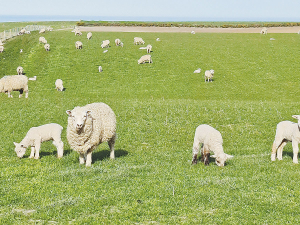Early weaning of lambs can be a valuable management tool that can advantage both ewes and lambs.
With the right quantity of legume-based forages, early-weaned lambs can grow as fast - if not faster - than their unweaned equivalents on traditional ryegrass and clover pastures. Early-weaned ewes can either be sold early, which frees up feed for other stock, or benefit from having more time to recover body condition before mating.
In late lactation, all lambs, but especially multiples, are receiving very little nutrition from the ewe and when grass growing conditions are below optimal.
The ewes are competing with their lambs, compromising the performance of both. By weaning them early onto correctly managed, high quality, legume-based forages, the lambs are given more opportunity to realise their genetic growth potential.
The weaned lambs should be allowed unrestricted access to high quality, legume dominant pasture (between 1,200 kgDM/ha and 2,000 kgDM/ha) or, ideally, a legume-based crop with a height of seven to 10 centimetres.
If lambs are being weaned onto a crop, they should be given time to adjust to a change in feed.
Running the ewes and lambs onto the crop for a few days before weaning, then running the lambs back onto the crop after weaning, will minimise the weaning check.
In trials¹ run at Massey University, researchers looked at weaning lambs early, at a minimum liveweight of 16kgLW, onto either a herb-clover mix or a lucerne sward. They found heavier lambs (over 20kg) cope best with early weaning, but the quality of the forage on offer is the biggest determinant of how lambs grow post-weaning.
Early weaning was most effective in seasons when grass growth was limited (pasture covers of under 900 kgDM/ha), and lambs weaned early were offered a herb-clover mix with a minimum pasture cover of seven centimetres.
If using lucerne, follow Good Management Practice for lucerne grazing (visit www.beeflambnz.com/ knowledge-hub/factsheets/lucernebook- summarypapers-establishingand- managing-lucerne). Fact sheet 220
¹ To view the summary visit: https://mro. massey.ac.nz/handle/10179/9791 More information: WWW.BEEFLAMBNZ. COM



















